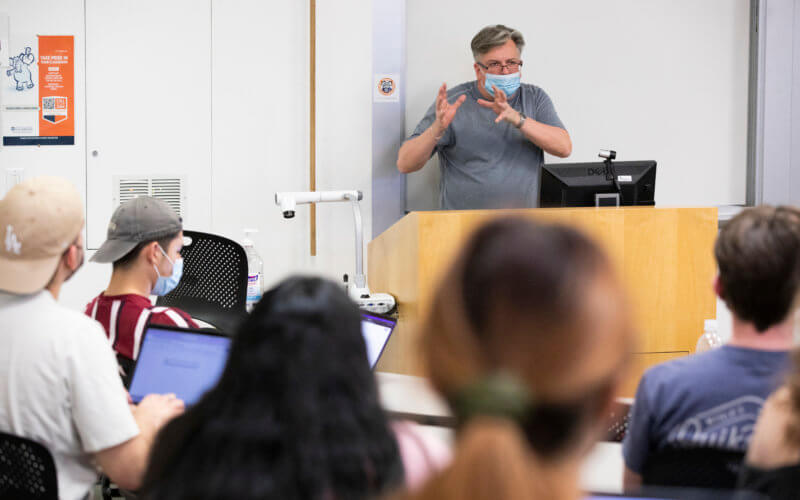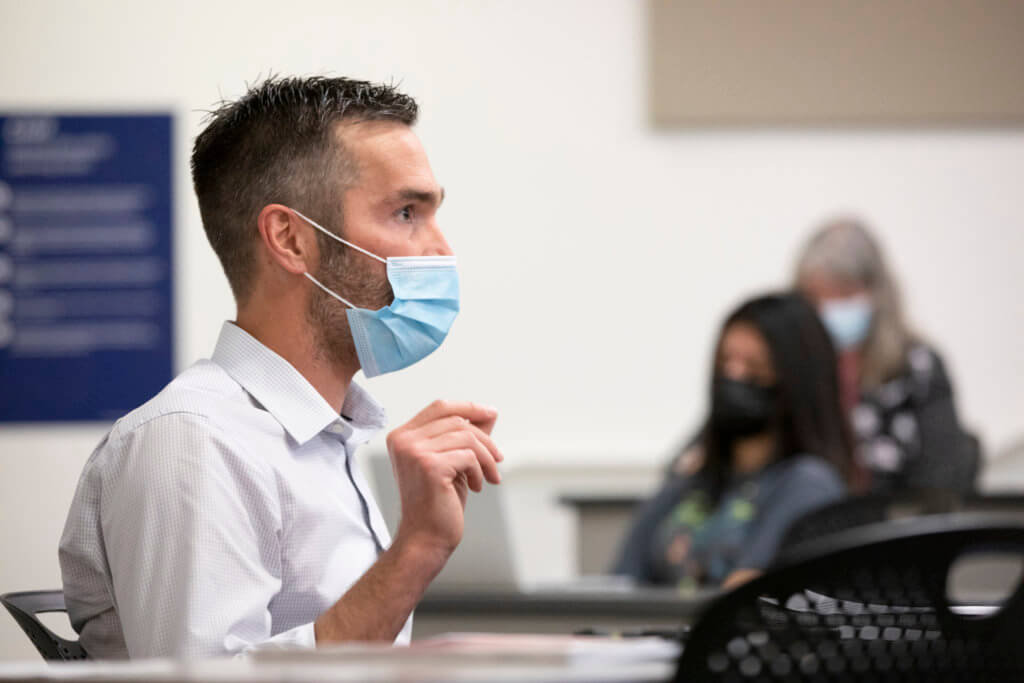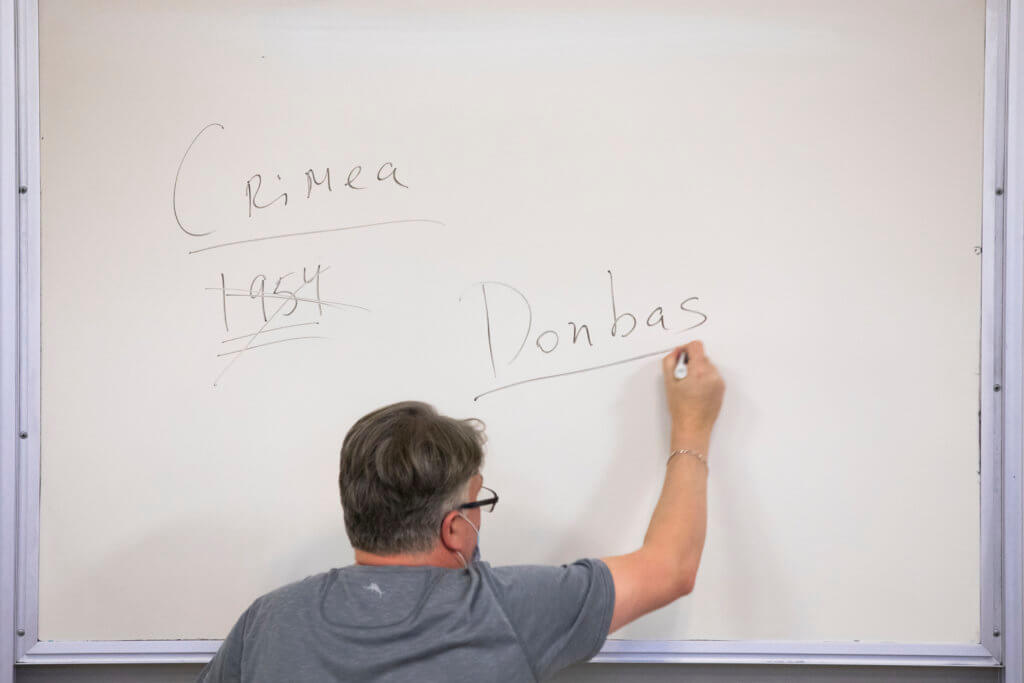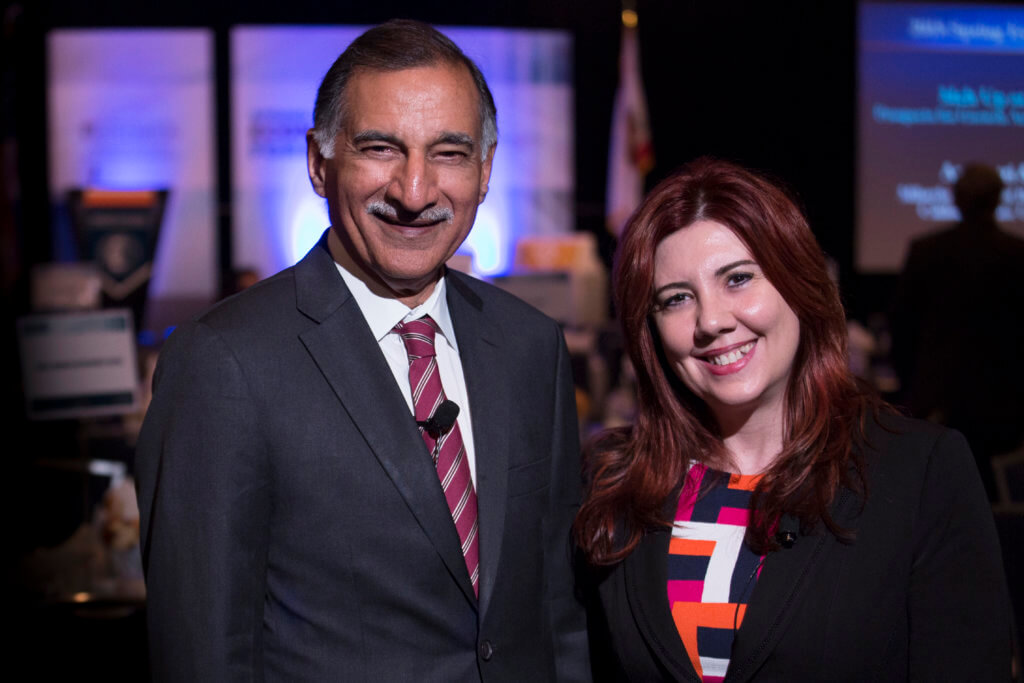
Cal State Fullerton Political Science Professor Alexei Shevchenko’s Monday class in national security was a bit different this week. Shevchenko teamed with David Traven, an assistant professor of political science and an expert in international security, to have a discussion with their students about Russia’s attack on Ukraine.
“We are in the midst of a huge crisis,” he said. “We are trying to make sense of where we are, what this means, and how this will affect foreign policy, security and international relations.”
To put this in historical context, Shevchenko described how Russia believes they were deceived by western countries. “Their complaint is that the security architecture developed in 1990 did not incorporate Russian interests and that the U.S. reneged on its promises not to expand NATO.”
This week, that focus turned into a real-world national security crisis with Russia’s incursion into Ukraine, dubbed by Russian President Vladimir Putin as a ‘special military operation,’ sparking the largest war Europe has seen since 1945.
“The basic plans seem to be to topple the government under the justification of de-Nazification of Ukraine,” said Shevchenko. “Obviously, this is more propaganda than reality.”

“I think the bigger issues behind the war concern the gravity of the situation,” said David Traven, an expert in the law and ethics of armed conflict. “This is a significant threat to international peace and security. Russia put its nuclear forces on ‘high alert’ and Biden did not reciprocate by putting our nuclear forces on high alert — probably to try to deescalate. But this is a fast-moving target and our approach may need to be revised.
“I think the Biden administration was too late in recognizing the threat and ruling out sending in U.S. forces,” he continued. “When facing a set of massive forces, openly saying we aren’t going to be involved could be seen by Russia as a green light to go in.”
Traven would have preferred to hear Biden say, “All options are on the table” so Putin wouldn’t know what America was going to do.
“That said, two nuclear-armed forces attacking would be catastrophic,” he said. “However, there is a long Cold War history of fighting through proxies and with covert methods, and the Russians know how this game is played. So we need to do all we can to make sure that the Ukrainian people succeed.”
Traven believes that how the war is framed will be critical. “To avoid being seen as having been provoked by the West, we need to make it clear that this war was Putin’s decision. Our response should have been to go forth with full sanctions. That signals credibility and affects the entire global community.”
He did note, however, that the past few days have made NATO more unified.
“The fighting is more difficult than Russia expected but Russia has many reserve forces,” he said. “The likelihood of escalating violence is high.”
Over the past few days, Russia’s attacks have intensified and are being aimed at dozens of residential areas of Kharkiv (Ukraine’s second largest city). Kyiv, the capital city, has also come under heavy assault. However, the stiff opposition that Russia is facing could make them more aggressive.
Even as rockets were firing, delegations from Russia and Ukraine met in Belarus with little progress.
Western leaders also need to be mindful of how every decision Russia makes will be determined by Putin.

“Right now, the Russian Army is not trying to attack civilians but if that happens, that’s a game-changer,” Shevchenko said. “Putin is thinking of himself as a historical figure. He wants to return Russia to its former glory when Europe was divided into spheres of influence … with Russia taking a leading role.”
Meanwhile, President Volodymyr Zelensky has become an unlikely hero not only to Ukrainians but to people throughout the world as he stays in his country and has been sending out defiant messages. He recently signed an application to join the European Union.
Sanctions: What’s Happening?
The U.S. Treasury Department announced a freeze on Russian Central Bank assets and other countries are following suit. The goal is to undermine the ruble and, so far, it seems to be working as its value has plunged.
“Russia is in the midst of a major financial crisis,” Shevchenko said. “Some believe the Chinese will help them but China might not necessarily lend economic support because of fear of Western sanctions. I think China thinks Russia has simply gone too far.”
Fighting in the Streets
“I think Russia wanted to get this over with quickly,” said Traven. “But they miscalculated the depth of the response. They didn’t expect the outpouring of nationalism on the streets. That said, Putin is a risk taker and he’s willing to risk a lot.”
Miscalculations by the Russian Military
When asked about the Russian military’s failure to secure a quick victory, Professor Shevchenko responded that “their defense minister has no military background – he was a ‘yes man’ with a personal connection to Putin. Just look at how long the Russian supply lines are – they can’t get through.”
How do the Russian People Feel?
“The majority of Russian people do not want this war,” Shevchenko said. “Look at the anti-war demonstrations. They occur despite heightened repression of the past few years. This might lead to a serious change, but in order to topple the government, the drop in living standards will have to be overwhelming.”
Economic Impact of Russia/Ukraine Conflict

Professor Anil Puri and Associate Professor Mira Farka, co-directors of the Woods Center for Economic Analysis and Forecasting at the university’s College of Business and Economics shared their thoughts on the economic impact of the Russia/Ukraine conflict:
The Russian-Ukraine war has reset the world order that has prevailed since the end of the Cold War and will have economic implications beyond those directly involved in the conflict. It presents a quasi stagflationary shock for Europe: a supply shock that comes on top of the supply disruptions due to the pandemic.
The U.S. is relatively insulated from this shock, though less than one would hope. The immediate and medium-term impact result is not just an upward march in inflation (via higher energy and food prices), it is also slower growth via jittery stock markets, a European slowdown and a difficult balancing act by the Federal Reserve in combating inflation without pushing the economy into the depths of a new recession. Such balancing acts rarely end up being perfectly executed.
Russia’s economy makes up only 3% of the world’s economy; Ukraine’s is less than 0.3%. Yet, Russia accounts for 42% of Europe’s gas imports and 26% of its oil imports. It only makes up less than 5% of oil and petroleum imports for the U.S. The EU is Russia’s largest trading partner accounting for 37% of its total world trade. Russia is the fifth-largest trading partner for the EU, accounting for 5% of its total trade. In contrast, Russia is the U.S.’ 30th largest trading partner, with a total trade of roughly $30 billion, a minuscule amount of its overall trade flows.
The sanctions implemented over the past few days will have a crippling effect on the Russian economy, especially the disconnect from SWIFT and the potential freezing of the Russian Central Bank’s $630 billion in foreign exchange reserves. The impact of SWIFT, though garnering more attention, is more incremental and less immediate. However, the pain from the second main sanction will be more severe.
Though the sanctions so far have stayed clear of the energy sector, allowing for continued payments of gas and oil from Russia, some of these sanctions will have a dampening effect on the European economy given its trade ties with Russia. It will also debt consumer sentiment in Europe, slowing growth even further. Though the U.S. is more insulated from a direct adverse effect from these sanctions, second-order effects through financial markets and slower growth in Europe will hamper growth as long as the conflict continues.